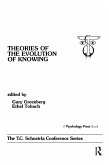The aim of this study is to show how the philosophies of Merleau-Ponty and the later Wittgenstein serve to establish, in very similar ways, (1) that subjects (persons) and what is subject-dependent, or in short, 'subjectivity', must be categorically distinguished from objects and what is subject-independent, or in short 'objectivity' and (2) that the 'sense' of the world as perceived, including linguistic sense, is a matter of the appearance of things and is therefore perception-dependent, and as such is in the category of subjectivity, not objectivity. The first claim is established not only by a study of the content of the arguments of the two philosophers, but also by a study of the form of their arguments: the kind of fallacy detection they deploy against their opponents exploits a logic dictated by the subject matter. In the course of examining a wide range of issues in meta- physics, epistemology, and the philosophies of mind, language, and mathematics, the 'Gestalt Philosophy' of Wittgenstein and Merleau-Ponty can be seen to constitute a new sort of 'anti-realism'.
Hinweis: Dieser Artikel kann nur an eine deutsche Lieferadresse ausgeliefert werden.
Hinweis: Dieser Artikel kann nur an eine deutsche Lieferadresse ausgeliefert werden.








